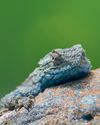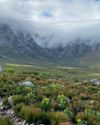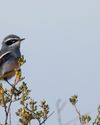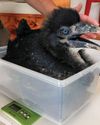Short-Tailed Shear Waters In The Atlantic Ocean

The Short-tailed Shearwater Arden-na tenuirostris is one of the world’s most abundant seabirds. Despite only breeding at islands off Tasmania and southern Australia, the total population is of the order of 30 million individuals. Like its close relative the Sooty Shearwater, it is a trans-equatorial migrant, wintering in the North Pacific Ocean and Bering Sea. During the austral summer, the birds travel south to about 60-68°S from the mouth of the Ross Sea to roughly 50°E.
Confusion with Sooty Shearwaters meant that it was only in the 1980s that researchers realised that Short-tailed Shearwaters ventured so far south. The two species are tricky to separate at sea and the presence of Short-tailed Shearwaters in Antarctic waters was only confirmed by examining birds that had died after colliding with research vessels. Initially it was assumed that these birds were non-breeders, but tracking and stable isotope studies in the late 1990s confirmed that breeding birds routinely forage in Antarctic waters.
Esta historia es de la edición Sep/oct 2017 de African Birdlife.
Comience su prueba gratuita de Magzter GOLD de 7 días para acceder a miles de historias premium seleccionadas y a más de 9,000 revistas y periódicos.
Ya eres suscriptor ? Conectar
Esta historia es de la edición Sep/oct 2017 de African Birdlife.
Comience su prueba gratuita de Magzter GOLD de 7 días para acceder a miles de historias premium seleccionadas y a más de 9,000 revistas y periódicos.
Ya eres suscriptor? Conectar

EXPLORING NEW HORIZONS
Keith Barnes, co-author of the new Field Guide to Birds of Greater Southern Africa, chats about the long-neglected birding regions just north of the Kunene and Zambezi, getting back to watching birds and the vulture that changed his life.

footloose IN FYNBOS
The Walker Bay Diversity Trail is a leisurely hike with a multitude of flowers, feathers and flavours along the way.

Living forwards
How photographing birds helps me face adversity

CAPE crusade
The Cape Bird Club/City of Cape Town Birding Big Year Challenge

water & WINGS
WATER IS LIFE. As wildlife photographer Greg du Toit knows better than most.

winter wanderer
as summer becomes a memory in the south, the skies are a little quieter as the migrants have returned to the warming north. But one bird endemic to the southern African region takes its own little winter journey.

when perfect isn't enough
Egg signatures and forgeries in the cuckoo-drongo arms race

Southern SIGHTINGS
The late summer period naturally started quietening down after the midsummer excitement, but there were still some classy rarities on offer for birders all over the subregion. As always, none of the records included here have been adjudicated by any of the subregion's Rarities Committees.

flood impact on wetland birds
One of the features of a warming planet is increasingly erratic rainfall; years of drought followed by devastating floods. Fortunately, many waterbirds are pre-adapted to cope with such extremes, especially in southern Africa where they have evolved to exploit episodic rainfall events in semi-arid and arid regions. But how do waterbirds respond to floods in areas where rainfall - and access to water - is more predictable? Peter Ryan explores the consequences of recent floods on the birds of the Western Cape's Olifants River valley.

a star is born
It’s every producer’s dream to plan a wildlife television series and pick the right characters before filming.